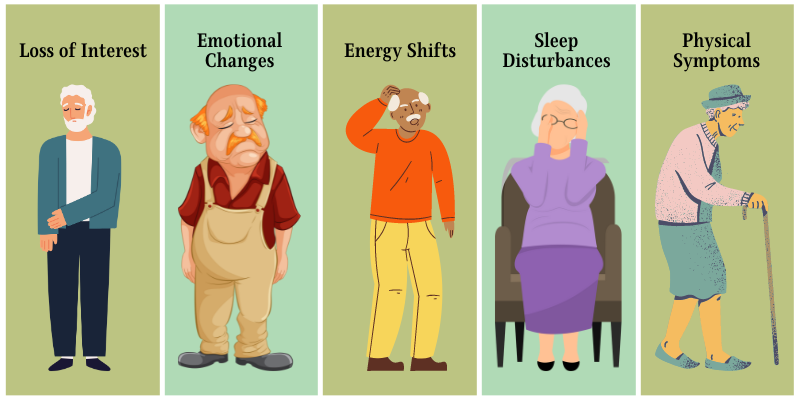- 16th Aug, 2024
- Dementia Care, Health, Mental Health, Senior Citizen Care Services
- 679
- Back
Is it Your Mood or Your Mind? Understanding Changes in Older Adults
It is normal to experience some cognitive changes as we age. However, when these changes start to interfere with daily life, it is important to investigate further.
Before jumping to conclusions about age-related diseases, it is crucial to consider the impact of mood on your thinking abilities. Research suggests a strong connection between mood and cognitive function. While many seniors enjoy fulfilling lives at home, it is essential to be aware of the support options available, such as Assisted Living Facilities In India, which can provide a safe and caring environment for those who may require additional assistance in the future.
Mood Changes in Older Adults
Mood fluctuations are common in older adults and can significantly affect cognitive performance. Here are some signs to watch for:
- Loss of interest: Diminished enthusiasm for activities once enjoyed.
- Emotional changes: Feelings of guilt, helplessness, or worthlessness.
- Energy shifts: Unusual increases or decreases in energy levels.
- Sleep disturbances: Difficulty falling asleep, early morning awakenings, or excessive sleep.
- Physical symptoms: New aches, pains, or digestive issues.

It is important to note that experiencing these symptoms does not necessarily mean you have a mental or physical health condition. However, if you are concerned, consulting with a healthcare professional is essential.
Changes in Thinking Abilities
“Recognising the subtle shifts in your cognitive abilities is crucial to maintaining independence and quality of life as you age. Early intervention can make a significant difference. Don’t hesitate to seek professional guidance if you notice changes in your thinking or mood. Remember, it is never too soon to prioritise your mental well-being”, mentions Care Manager of Jagriti Dham.
Recognizing changes in thinking can be challenging. Some common signs include:
- Memory difficulties: Trouble remembering recent events or information.
- Difficulty with daily tasks: Struggling with managing finances, organising, or completing household chores.
- Challenges with multitasking: Finding it harder to handle multiple tasks simultaneously.
If you notice these changes, it is essential to discuss them with a healthcare provider.
Seeking Professional Help
Navigating the healthcare system can be overwhelming, especially when dealing with complex issues like mood and cognitive changes. While the roles of different professionals can overlap, understanding their specialties can help guide your decision. For those requiring more comprehensive care, exploring options like Assisted Living Facilities In India could also be beneficial.

- Family medicine physician: Your primary care provider is a good starting point for discussing concerns about mood and thinking. They can conduct a general evaluation and refer you to specialists if needed.
- Nurse: Nurses can provide support, education, and monitor your health status. They often work closely with physicians.
- Caregiver: If you have a caregiver, they can offer valuable insights into your changes and help communicate your concerns to healthcare providers.
- Clinical psychologist: Specialises in diagnosing and treating mental health conditions through therapy.
- Psychiatrist: A medical doctor specialising in mental health who can prescribe medication.
- Therapist: Offers guidance and support through talk therapy, focusing on coping strategies and emotional well-being.
- Mental health counselor: Provides counseling and therapy services to address mental health concerns.
Starting the Conversation
Talking about changes in mood and thinking can be difficult, but it is essential for your well-being. These conversations can be a crucial first step in seeking appropriate support, whether it is through counseling, medication, or considering options like Assisted Living Facilities for Seniors. Here are some tips:
- Be specific: Clearly describe the changes you’ve noticed.
- Keep a journal: Track symptoms and patterns over time.
- Bring a support person: Having someone with you can provide additional information and support.
- Trust your instincts: If something feels off, don’t hesitate to seek help.
Remember, seeking help is a sign of strength, not weakness. By addressing these concerns early, you can take steps to improve your overall health and well-being

